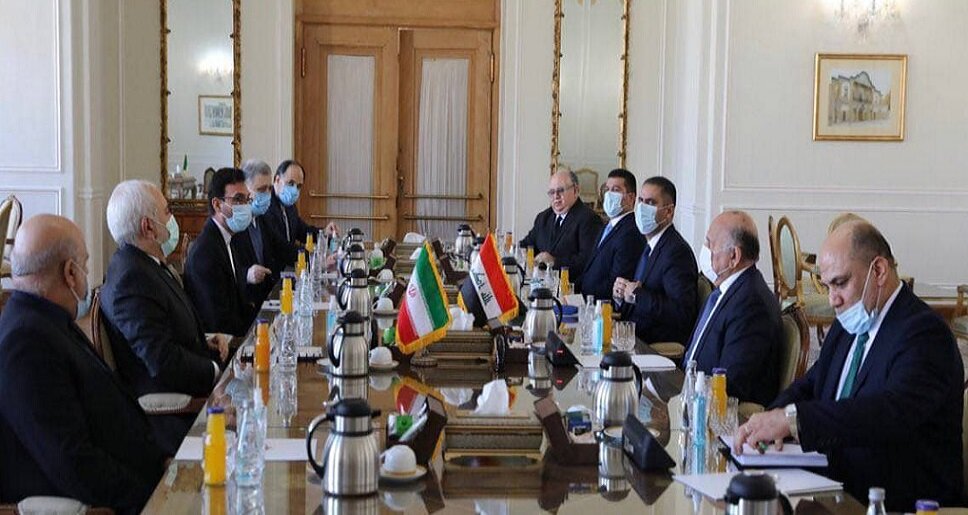Iraqi FM heads to Iran amid regional de-escalation drive

TEHRAN – The chief Iraqi diplomat visited Tehran on Wednesday to discuss a range of issues in what appeared to be the latest in a series of regional diplomatic efforts to cool tensions in the Persian Gulf region.
Upon his arrival in Tehran, Fuad Hussein met with his Iranian counterpart Mohammad Javad Zarif and Iran’s top security official Ali Shamkhani. The foreign ministries of Iran and Iraq were tight-lipped about the details of the discussion.
The Iranian Foreign Ministry issued a statement saying that during the Wednesday meeting Zarif and Hussein discussed a range of issues including the latest development in bilateral relations and regional and international issues. It stopped short of providing any details about these issues.
On the other hand, the Iraqi Foreign Ministry also avoided providing details.
According to the Iranian Foreign Ministry’s statement, Zarif and Hussein discussed bilateral issues as well as Iraq’s efforts regarding the assassination of the top Iranian general, Qassem Soleimani, and his Iraqi comrade Abu Mahdi al-Mohandis.
Zarif described the U.S. move to assassinate General Soleimani and al-Muhandis as a “terrorist act,” saying that “putting an end to the presence of the U.S. forces in the region is the best reaction to this terrorist act.”
Shamkhani echoed the same remarks, describing the U.S. military presence in Iraq as a source of instability.
“The main cause of instability and the escalation of crises in the region is the sinister presence of foreign forces, especially American forces,” Shamkhani said.
But apart from bilateral issues, the Iraqi foreign minister’s visit to Iran could well be an attempt by Iraq to de-escalate tensions between Iran and some Arab countries in the region such as Saudi Arabia and the United Arab Emirates.
The visit took place two days after Nayef al-Hajraf, the secretary-general of the Persian Gulf Cooperation Council, traveled to Iraq to meet with Iraqi leaders including Hussein, Prime Minister Mustafa al-Kadhimi and President Barham Salih.
Following the meeting between al-Hajraf and Hussein, the Iraqi Foreign Ministry said in a tweet that the two officials held talks on “how to cooperate and coordinate in building good relations with regional countries,” without referring to certain countries.
It remains to be seen whether the chief Iraqi diplomat tried to convey a message from Persian Gulf’s Arab states to Iran. Iraq has made efforts to mediate between Iran and Saudi Arabia over the past years. But these efforts failed to bring Tehran and Riyadh to the negotiating table.
With Joe Biden taking office in the U.S., however, regional mediators have apparently seen a new opportunity to bring Saudi Arabia and Iran closer together.
Kuwait is a case in point. It has recently expressed renewed interest in resuming its mediation efforts after it, together with the U.S., succeeded in brokering a reconciliation deal between Qatar and the so-called Arab quartet, which includes Saudi Arabia, Bahrain, Egypt and the UAE, putting an end to a three-and-half-year crisis in the Persian Gulf region.
Now that the crisis has come to an end, Kuwait seems to be more confident to embark on a much important dispute between Tehran and Riyadh.
“Kuwait is ready to pursue its mediation between Saudi Arabia and Iran when the appropriate conditions are created,” diplomatic sources familiar with the matter at Kuwait’s Foreign Ministry told Anadolu Agency on Tuesday.
This readiness was expressed nearly a week after Deputy Foreign Minister of Iran Seyed Abbas Araghchi visited Kuwait to tell the Arab country that Iran will not negotiate with the West over regional issues.
“I met today with the Minister of Foreign Affairs of the State of Kuwait and it was a very useful meeting during which I confirmed that the Islamic Republic of Iran will not negotiate with the member states of the nuclear agreement on any issue other than the method of implementation. Regarding the security of the Persian Gulf region, we are ready for dialogue exclusively with the countries of the region without any foreign intervention,” Araghchi said in a tweet following a meeting with the top Kuwaiti diplomat.
Arabic Post, a news website close to Qatar, cited an Iranian diplomatic source as saying that Araghchi’s visit was aimed at “discussing ways of Kuwaiti mediation in order to conclude Iran-Saudi Arabia dialogue.”
The news website also said that a Kuwaiti delegation is expected to visit Iran in the coming days to advance the Kuwaiti mediation efforts. Citing Kuwaiti diplomatic sources, Arabic Post claimed that the Kuwaiti delegation will discuss issues related to the dialogue between Iran and Saudi Arabia.
“We are discussing in the coming days a visit to Tehran, to inform the Iranian leadership of the Saudi demands, and to try to find workable solutions to persuade the two parties to come to the negotiating table,” a Kuwaiti diplomatic source told Arabic Post.
